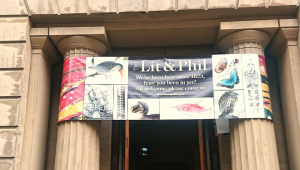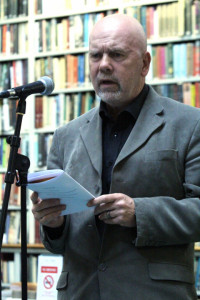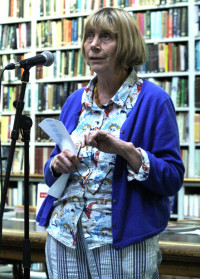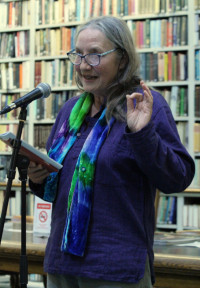Picture this: poets give their support to north-east photographic gallery forced to close

A much-loved photographic and film gallery in the centre of Newcastle was forced to close in April after losing its Arts Council grant, and facing rising energy bills. But that’s not the end of the story.
A fundraising campaign has been launched to aid the reopening in 2024 of the Side Gallery, run by Amber Film and Photography Collective, and poets in the region have added their voices and support to that campaign, which has already raised more than £60,000 towards this target.

Louise Karlsen, the first to read, included a poem about “the kind of man in the north-east for many, many years”, although hastening to add that “my partner bears no resemblance”. She added: “I occasionally lapse into fun.”

Digging the foondations
For a new Classical-Age me bosses say!
I say it’s aal Greek to me, but Ionic Colonnades
Will rise again out of wor bonny
Elswick Honey stone!
Garry’s poem has a tender personal element as well. It also pays heed to other elements of Newcastle’s past – “over-crooded tenements where they’re dropping down like flies … Homely cooking of poached Blaydon rabbit”. He read it with hypnotic power – and pride, too, in his city. And why not?
Lindsay Balderson included a poem about the unexpected introduction of conveyor-belt sushi at Newcastle’s famous department store Fenwick’s: “The deal was sealed with a Japanese beer …” There was another poem that harked back to the 18th century and my forsaken county of Surrey, a notorious hoax involving a woman who claimed to have given birth to a rabbit in Godalming.

Gene Groves contributed a poem, ‘Whitley Bay, 1978’, inspired by a photograph from the Side Gallery, and another, ‘Disappearing Act’, about family photos. She also revealed that she came from a fairground family, “fourth generation”, and had worked at the fair in Rhyl in her teens: “A raffle ticket, like a sweet-paper tucked up a child’s nostril … couples welded together … a ten o’clock whistle signals closing time.” Wonderful observational detail. As good as a photograph.
Robin Moss is aged in his mid-seventies, and by his own admission tends to dwell on mortality, but generally in a humorous way: “Everybody is busy dying or having their hips replaced.” Another poem, ‘September Swallows’, “knowing they have to leave, not sure that now is the time”, could be seen in the same light. ‘Inheritance’ was about still musing about your parents, even at this stage of life: “I have his sheepskin-lined leather gloves … if only I was truly like him.”

Pippa Little supplied a poem based on a photograph from the Side Gallery, and another, ‘Me and Diane Arbus’, about the influential American photographer: “I’m the dwarf in high heels … ugly is not a word we recognise, she said.”
Joan Johnston’s poem about her father was inspired by a photograph of him holding her up to climbing roses when she was a baby. Another poem, titled just ‘1977, a day’, was dreamily evocative, with lines like “and I was on Valium, anyway … up-river, big trees, heavy leaves …”. It reminded me of a play by Beckett.
The final poet of the evening was the award-winning Linda France, who reminded us of why we were there, insisting that “we depend on the arts and culture for our very survival”.

The campaign #SaveSide has posted a video compiled from visitor reactions and testimonies on the weekend before the Side Gallery closed in April. Maybe a sudden, surprise withdrawal of funding – whatever any justification for it – can represent a challenge to a community, to show how much a particular institution matters to it.
If so, the moving impressive video testimonies alone provide a powerful response to the Side Gallery's funding withdrawal. The people – including the poets - have spoken. Let’s hope it can be saved!





Uilleam Ó Ceallaigh
Mon 29th May 2023 12:02
This is the first time I've heard about Side.
I wish all the best to those who are trying to save what is plainly a valuable and important asset.
There's hope for the future of society when people are willing to go to such lengths to defend the arts.